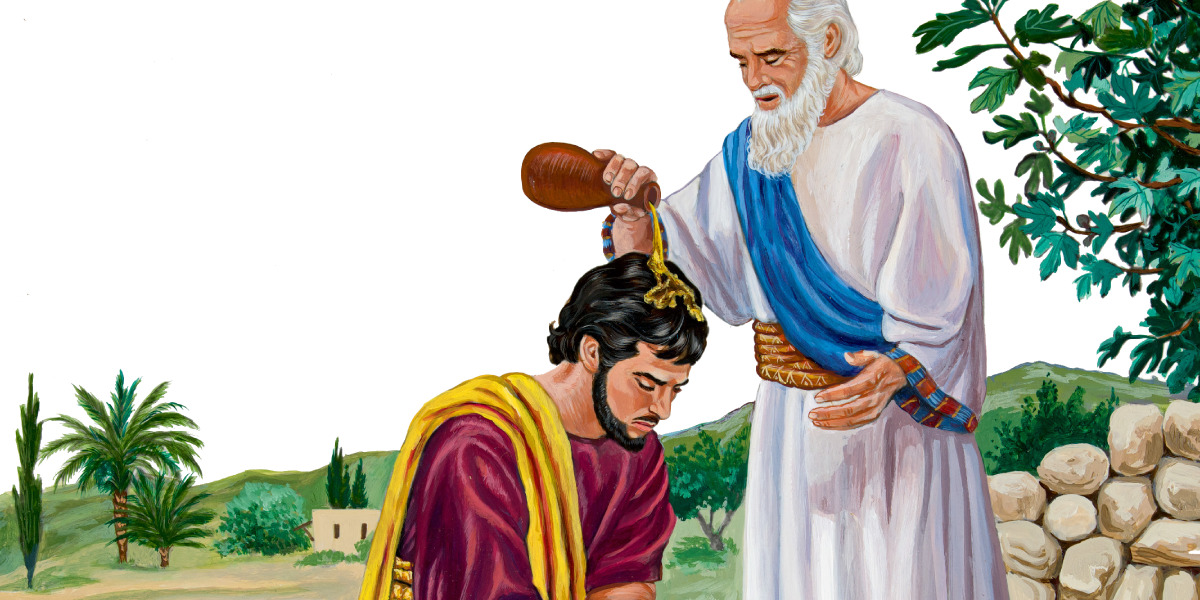Let’s get a quick lay of the land of 1st Samuel.
Basically this book can be broken up into 3 main parts as follows:
PART ONE:
In Chapter 2 we’re presented with what’s called the Song of Hannah.
This prayer is a theological feast that highlights God’s attributes and just how sovereign He is.
It is Adonai who raises men up and causes their downfall.
It is Adonai who makes us clean and saves us.
It is Adonai who ends life and resurrects life.
It is Adonai who brings a dead womb back to life.
It is Adonai who rescues the poor and humbles the rich.
It is Adonai who has the authority to judge all men.
And finally it is Adonai who is holy with no other comparable entity in the entire universe.
PART TWO:
In the 7th chapter the story of how Samuel rose to power unfolds.
This story took place during a time of peace…
But here’s what’s interesting…
It took place during a time of Satanic peace between Israel and the Philistines.
That’s right.
Israel had compromised by allowing herself to enter into a relationship forbidden by God.
And it was time for that apostasy to end.
So Samuel gathered everyone to a place called Mizpah to hold a worship ceremony of repentance.
During this time, Samuel acting as priest offered up a sacrifice.
However, this provoked the Philistines because they saw it as a threat and an unlawful assembly and so decided to attack Israel.
Fortunately, Adonai was with Israel who successfully rounded off their attackers…
At the end of the battle, the Israelites began to question if they really needed an earthly king to rule over them.
Why?
Because Samuel who was operating more or less like a Judge seemed more than sufficient.
PART THREE:
By the time we arrive at Chapter 12, we have Israel crying out yet again for a king with Samuel finding himself powerless to resist the people’s demands.
This brought up a lot of issues.
Was it possible for Israel to have both a king and a judge ruling over them?
Wouldn’t that cause too much conflict?
And more importantly…
What about Israel’s covenant relationship with the Lord?
Wasn’t YHWH Himself supposed to be Israel’s king.
That’s what Samuel was really worried about.
Also, if Israel took on a king, what would happen to Samuel’s role?
Because he also served as a king.
What ended up happening is when Saul became king, he ruled over Israel’s political matters while Samuel represented the Lord’s spiritual values.
The only problem is the political and the spiritual were NOT to be divided.
So having 2 rulers like this in Israel caused a lot internal conflict.
Who was the higher authority in this case?
Saul or Samuel?
So here we see the king/prophet Biblical pattern being introduced.
The Prophet would be the one to bring God’s Words to whoever was the king of Israel at a given time…
And the king was to OBEY the words of the prophet…
But as we shall see moving forward, more often than not, that didn’t happen.
Okay, so this concludes this 3-part summary of the big themes contained in the books of Samuel.
As it was with the book of Judges, there are a ton of lessons (and warnings!) that are applicable to our lives today.
What’s also really exciting is you’ll begin to see the principles of the Torah being fleshed out in the stories ahead.
See ya all next time.




When studying for my MBA, we learned that there are three types of authority: legal, technical, and implied.
Legal authority is what Saul had because he had been given that through his anointing by God.
Implied authority is what Samuel had, as he was known to be close to and have a personal, working relationship with God.
Technical authority was also given to Samuel, as he had been trained int he Jewish customs and Torah by Eli, one of the greatest judges of that time.
So, in asking who had more authority- Saul or Samuel- it depends on what type of activity we are talking about.
The proof that the king, ultimately, had the higher authority in the human realm is, as you pointed out, Rich, shown by the fact that they often refused to listen or obey their prophets.
In fact, in Israel (The Northern Kingdom) the kings often jailed, or even killed, their prophets when the prophet said something the king didn’t like. Elijah was powerful enough that Ahab didn’t try to hurt him, although Jezebel wanted to have him killed.
In the long run, the ultimate authority on earth is God (duh, right?), and even when the king ruled against or overruled the prophet/judge, eventually God overruled the king.
The best example of a king who worked with his prophet is, of course, David and Nathan.
Hi Steven,
This is really a great comment and a nice complement to the information I provided in this article. Thanks so much for sharing! Shalom.
Rich,
Excellent write-up.
Just one query –
Noted that you use the title “the Lord”, which we assume as in reference to YHWH. Why didn’t you consider to use the actual Hebrew transliteration “ADONAI” instead? Many readers (especially contemporary Christians) may mis-interpret “the Lord” as referring to the Lord Jesus.
Gim
Good idea. I think I’ll do that.
Rich,
Glad that you are agreeable to the use of the title “ADONAI” in reference to YHWH (as per the original Hebraic scriptures). Consequently you may also note that the Mashiach’s title as used in below BTC (Book of The Covenant) bible is always “my/ the Adon” (never ADONAI).
https://www.btc2023.net/1-prologue